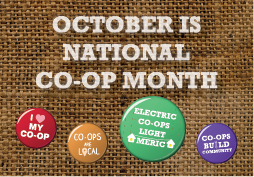 During October we celebrate Cooperative Month. But why? Are cooperatives still relevant? Do they impact your life today? Do they help improve life in the communities they serve?
During October we celebrate Cooperative Month. But why? Are cooperatives still relevant? Do they impact your life today? Do they help improve life in the communities they serve?
Since you are reading this column in an electric cooperative sponsored magazine, I’ll assume you belong to at least one cooperative.
Electric service came first to rural areas more than 75 years ago because the cooperative business model worked. Later, when people saw this cooperative demonstration worked for electricity, it sparked the creation of telephone, water and now internet service cooperatives. In this issue you can read more about how co-ops are providing internet services in rural areas and using their cooperatively-built fiber network to add smart grid features as well.
The common thread is they are all in the life improvement business and based on the cooperative business model and principles.
Okay, but what else can cooperatives do? If you are involved in farming or an agriculture-related career, cooperatives are pervasive. From the GrowMark FS supply and grain network that provides fertilizer, herbicides and seeds for its farmer members, to Farm Credit Services that finances those inputs, to local farmer-owned grain elevator cooperatives, to producer cooperatives like Prairie Farms Dairy — cooperatives have a very large footprint in the farm community.
What if you are not involved in agriculture? Well, let’s look at a typical day for just about any of us. You start your day with a glass of Sunkist fruit juice and a piece of toast spread with Land O’Lakes butter. You head for work, dropping off your child at a local daycare center along the way. After work, you visit your credit union to make a deposit and you stop by the grocery store to pick up food for dinner. Later that evening, you review your homeowner’s insurance policy.
You’ve just done business with several cooperatives.
From large cooperatives such as Sunkist and Land O’Lakes to credit unions, many insurance companies, lots of food-producing enterprises, and a number of daycare centers — cooperatives play a part in virtually every facet of our lives. More than 100 million Americans are members of the 47,000 cooperatives operating in this country alone.
Cooperatives function in virtually every economic sector and country around the world. There are producer-owned cooperatives like those in agriculture. There are worker-owned cooperatives that are found in almost every industry from food stores and restaurants to taxicab companies. And there are consumer-owned cooperatives like your electric cooperative. Consumer-owned cooperatives also include housing, healthcare, insurance, financial services, child care and more. Is there a need for a product, or a service in your area? Chances are a cooperative might be a viable and possibly the best solution.
Cooperatives are private enterprises — not part of government. To be sustainable they must operate on sound business principles and practices. Cooperatives are not-for-profit businesses which return any earnings, not needed to pay expenses, to the member-owners proportionally based on their participation, or reinvest those earnings in the cooperative as the members choose.
A cooperative is owned and controlled by those it serves. Its consumer-owners set the policies that control the business and share that control equally. The members elect a board of directors, officers and committee from its own ranks. The board of directors, in turn, hires the management and provides the governance for the business. Each member has not only the right, but also the responsibility, to speak up at meetings, vote, and to make suggestions about ways the cooperative can better serve its members.

At the root of all cooperatives is a foundation of principles. Perhaps the best way to understand what a cooperative is, and how it operates, is to look at the seven cooperative principles. They are: voluntary and open membership; democratic member control; member economic participation; autonomy and independence; education, training and information; cooperation among cooperatives and concern for community.
Cooperatives will remain viable and relevant if they continue to honor these principles, focus on the future and remain committed to their life improvement mission.










